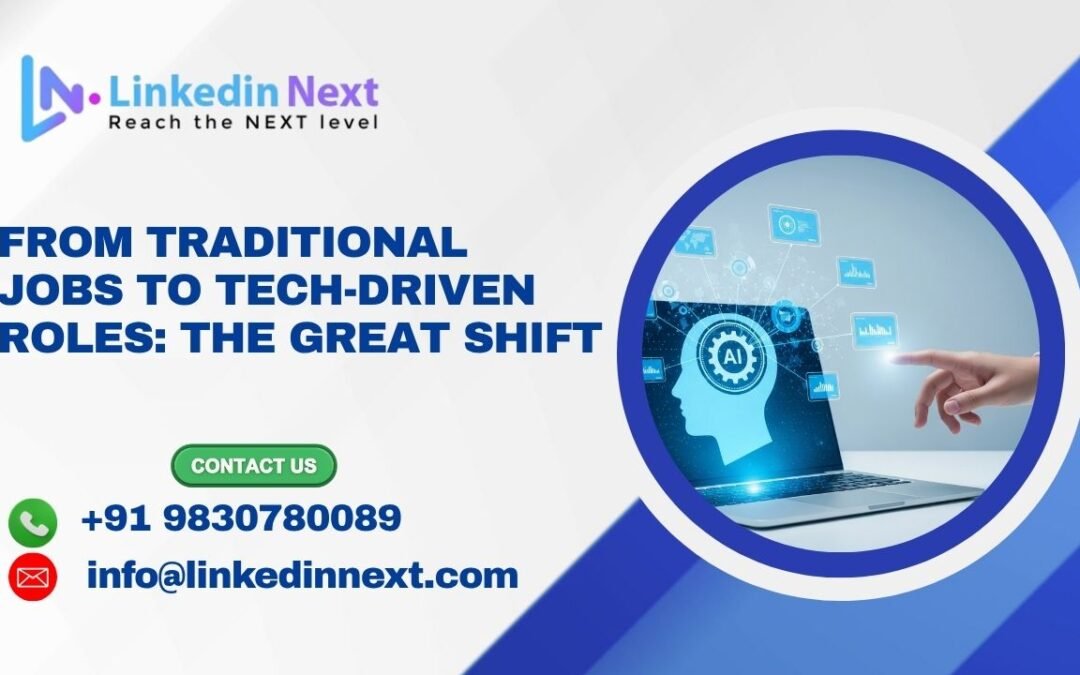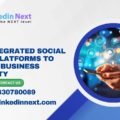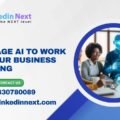From Traditional Jobs to Tech-Driven Roles: The Great Shift.
From Traditional Jobs to Tech-Driven Roles: The Great Shift. The global workforce is undergoing a massive transformation. Over the past decade, technological innovation has disrupted every industry — from manufacturing to marketing, from healthcare to education. Traditional jobs, once dependent on manual skills and physical labor, are increasingly being replaced or enhanced by tech-driven roles that demand digital literacy, data analysis, and artificial intelligence expertise. This great shift is redefining how we work, the skills we need, and the future of employment itself.
Understanding the Shift: Why Technology Rules the Workplace
The Fourth Industrial Revolution has ushered in an era where automation, machine learning, and digital connectivity dominate. Companies are integrating technologies such as AI, IoT (Internet of Things), and blockchain to streamline operations, increase productivity, and reduce costs. As a result, professionals who once relied on traditional craftsmanship, clerical work, or repetitive tasks are now adapting to digitally augmented environments.
This transformation is not merely about job replacement but job evolution. Technology has given rise to new categories of employment that didn’t exist a decade ago — such as data scientists, cybersecurity analysts, cloud engineers, and UX/UI designers. The global labor market now demands not just technical know-how but adaptability and continuous learning.
From Manual Labor to Digital Mastery
The transition from manual to digital roles is evident across industries. For instance:
-
Manufacturing: Automated robotics and smart factories are replacing assembly line workers with robotics engineers and automation specialists.
-
Retail: Traditional cashiers and sales clerks are giving way to e-commerce managers and digital marketing strategists.
-
Finance: Bank tellers are being replaced by fintech developers and data analysts who build digital banking solutions.
-
Healthcare: Medical professionals are now supported by AI-powered diagnostic tools and telemedicine platforms that require tech-trained support staff.
The line between physical and digital work continues to blur as every role becomes interconnected with technology.
The Rise of Tech-Driven Skills
To remain relevant in this rapidly evolving landscape, professionals are prioritizing digital skill acquisition. Organizations worldwide now value employees with cross-functional expertise — a mix of domain knowledge and technical proficiency.
Key Emerging Skills Include:
-
Data Literacy – The ability to interpret, analyze, and communicate insights from data is a universal requirement across industries.
-
Coding and Software Development – Even non-IT roles benefit from understanding programming logic and software integration.
-
Cybersecurity Awareness – As businesses digitize, protecting information becomes critical, giving rise to demand for ethical hackers and cybersecurity experts.
-
AI and Machine Learning Knowledge – Understanding algorithmic decision-making helps organizations leverage predictive analytics for better outcomes.
-
Digital Marketing and Analytics – With commerce shifting online, marketers must navigate SEO, social media analytics, and content optimization.
The Gig Economy and Remote Revolution
The gig economy has exploded in parallel with technological advancement. Platforms such as Upwork, Fiverr, and Toptal have empowered millions to monetize their skills globally. Freelancers can now deliver services ranging from graphic design to AI model training — without geographical constraints.
At the same time, remote work technologies like Zoom, Slack, and Microsoft Teams have normalized hybrid and remote work environments. This flexibility has not only enhanced work-life balance but also opened opportunities for global collaboration, reshaping traditional notions of the workplace.
AI Integration and Its Impact on Employment
Artificial Intelligence is both a disruptor and a creator. While automation replaces repetitive roles, AI simultaneously generates opportunities for AI ethics consultants, machine learning engineers, and data infrastructure specialists.
AI-powered tools are now streamlining recruitment, optimizing workflows, and enhancing decision-making. However, they also necessitate ethical oversight and human supervision — reinforcing the idea that technology complements rather than completely replaces human labor.
Industries Experiencing the Greatest Transformation
1. Finance and Banking
The finance sector has undergone radical change with the emergence of digital banking, cryptocurrency, and fintech solutions. Analysts predict that traditional roles like bank clerks will diminish by 30% by 2030, while blockchain developers and quantitative analysts will continue to grow in demand.
2. Education and Learning
Education is now driven by e-learning platforms, virtual classrooms, and AI tutors. Teachers are embracing EdTech tools that personalize learning experiences and gather real-time feedback. The new educator is both a teacher and a technologist.
3. Healthcare and Biotechnology
The healthcare industry is leveraging AI diagnostics, robotic surgeries, and wearable health devices. Careers in bioinformatics, data-driven medicine, and telehealth are expanding rapidly, replacing conventional administrative and diagnostic roles.
4. Retail and E-Commerce
With the rise of online marketplaces, logistics optimization, and digital advertising, the retail sector has transformed. Professionals skilled in SEO, content creation, and UX design now drive customer engagement and retention.
5. Manufacturing and Engineering
Smart manufacturing powered by IoT and robotics is creating new opportunities in systems integration, predictive maintenance, and automation design. Engineers must now understand coding, sensor technology, and data systems to remain competitive.
The Role of Upskilling and Reskilling
To thrive in the age of automation, continuous learning is non-negotiable. Governments, universities, and corporations are investing heavily in reskilling programs to prepare workers for new-age roles. Initiatives like Google Career Certificates, IBM SkillsBuild, and LinkedIn Learning are bridging the gap between traditional education and modern workforce needs.
Employers are also encouraging lifelong learning by sponsoring training programs and creating internal mobility paths that align with digital transformation goals. The focus is clear — those who learn continuously will lead, while those resistant to change will lag behind.
Challenges in the Tech Transition
While the shift to tech-driven roles offers immense opportunities, it also presents formidable challenges:
-
Job Displacement: Automation threatens millions of low-skill jobs globally.
-
Skill Gap: Many workers lack the technical training required for emerging roles.
-
Digital Divide: Unequal access to technology and the internet restricts opportunities in developing regions.
-
Workplace Adaptation: Older generations often struggle to adapt to new technologies, requiring dedicated training and mentorship.
Overcoming these barriers demands policy reform, education innovation, and corporate responsibility to ensure inclusive progress.
The Future of Work: Human-AI Collaboration
The workplace of the future will not be man versus machine, but man with machine. Human creativity, empathy, and ethical judgment will remain irreplaceable assets, while technology will handle analytical and repetitive tasks.
The most successful professionals will be those who combine emotional intelligence with technological fluency — capable of using AI as an ally to enhance productivity, innovation, and problem-solving.
Conclusion: Embracing the New Work Paradigm
The world of work has irreversibly changed. As industries adopt automation, AI, and digital ecosystems, the need for adaptable, skilled, and forward-thinking professionals becomes paramount. The great shift from traditional jobs to tech-driven roles is not just a phase — it is the foundation of a new digital economy.
Organizations and individuals who embrace this transformation today will lead tomorrow’s innovation, growth, and prosperity. The message is clear: learn, adapt, and evolve — because the future of work is already here.
Also read our more BLOG here.
Thank you for read our blog “From Traditional Jobs to Tech-Driven Roles: The Great Shift”.
I hope this blog is helpful to you, if you have any question feel free contact us at
Call/WhatsApp: +91.9830780089 || Email: info@linkedinnext.com







Recent Comments